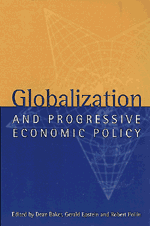Book contents
- Frontmatter
- Contents
- List of figures
- List of tables
- List of contributors
- Editors' acknowledgments
- 1 Introduction
- I The IMF, the World Bank, and neo-liberalism
- II Foreign direct investment, globalization, and neo-liberalism
- III Globalization of finance
- 6 Implications of globalization for macroeconomic theory and policy in developing countries
- Comment by Robert Blecker
- 7 Asia and the crisis of financial globalization
- Comment by Sule Ozler
- 8 Globalization and financial systems: policies for the new environment
- Comment by Ilene Grabel
- 9 Housing finance in the age of globalization: from social housing to life-cycle risk
- Comment by Jane D'Arista
- IV Trade, wages and the environment: North and South
- V Migration of people in a global economy
- VI Globalization and macroeconomic policy
- Bibliography
- Index
Comment by Sule Ozler
Published online by Cambridge University Press: 04 August 2010
- Frontmatter
- Contents
- List of figures
- List of tables
- List of contributors
- Editors' acknowledgments
- 1 Introduction
- I The IMF, the World Bank, and neo-liberalism
- II Foreign direct investment, globalization, and neo-liberalism
- III Globalization of finance
- 6 Implications of globalization for macroeconomic theory and policy in developing countries
- Comment by Robert Blecker
- 7 Asia and the crisis of financial globalization
- Comment by Sule Ozler
- 8 Globalization and financial systems: policies for the new environment
- Comment by Ilene Grabel
- 9 Housing finance in the age of globalization: from social housing to life-cycle risk
- Comment by Jane D'Arista
- IV Trade, wages and the environment: North and South
- V Migration of people in a global economy
- VI Globalization and macroeconomic policy
- Bibliography
- Index
Summary
The author's main contention is that financial globalization has not brought the benefits that were promised by the “current orthodoxy.” Taking this one step further, he argues that financial globalization has had growth-retarding effects. As a policy conclusion, the author suggests that money center countries levy a uniform tax to curb financial globalization at its source.
Reading this chapter led me to reflect upon several issues. First, the chapter draws attention to the context in which financial flows take place. I see a sharp break in the post-1973 period from the earlier 1948–73 period in many respects, including ideological, political, and economic ones. In the earlier period, Keynesian aggregate demand management was being implemented internationally as well as nationally; the capital flows provided by the U.S. government in the form of aid is a manifestation of this policy. Even though many developing countries were implementing import substitution policies, the funds were primarily used to purchase capital goods from the U.S. Such policies could of course benefit the U.S. to the extent that it kept its privileged position.
In contrast, the post-1973 period, following the first oil crisis, is a time of capitalist crisis in the core countries and the loss of U.S. hegemony. At this time, “monetarism” – effectively a new version of 19th century liberalism – appeared as a new dominant ideology in reaction to the crisis of declining profit rates.
- Type
- Chapter
- Information
- Globalization and Progressive Economic Policy , pp. 192 - 194Publisher: Cambridge University PressPrint publication year: 1998



